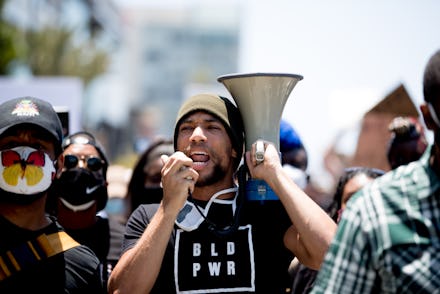Black celebrities demand Hollywood reconsider its relationship with police

In the wake of George Floyd’s death, as the Black Lives Matter movement has coalesced into a social revolution, workers in nearly every industry are demanding their employers put their money where their mouths are. Activists have succeeded in convincing institutions like the Minneapolis School District, Denver Public Schools and the University of Minnesota to divest from policing and invest in their communities. There’s also a growing call for the entertainment industry to change its relationship with the police, namely the way movies and TV shows tend to glorify rogue, often violent cops and push stereotypes of Black people as criminals.
Insecure actor Kendrick Sampson was hit with a police baton and shot seven times by rubber bullets at a Los Angeles protest he helped co-organize in late May. Now, he has penned an open letter to Hollywood, published by Variety, demanding the entertainment industry divest from police and invest in the Black community. Tessa Thompson and Black Lives Matter co-founders Patrisse Cullors and Melina Abdullah helped compose the letter, as well. It’s signed by more than 300 Black artists and executives, including Zoë Kravitz, Chadwick Boseman, Billy Porter, Cynthia Erivo, Michael B. Jordan, Issa Rae, Octavia Spencer, Danai Gurira, Idris Elba, Viola Davis, and many more.
Some of the asks in the letter are tangible, while others are more abstract. Sampson and his co-signers argue that Hollywood has an outsized influence on culture and politics and thus has a responsibility “to use our influence to imagine and create a better world. Yet, historically and currently, Hollywood encourages the epidemic of police violence and culture of anti-Blackness,” the letter states. So what would it mean for Hollywood to divest from policing and invest in Black communities in meaningful ways?
Firstly, Black Hollywood demands a moratorium on stories that glorify dirty cops. “We must end the exaltation of officers and agents that are brutal and act outside of the law as heroes. These portrayals encourage cops like Derek Chauvin, the officer responsible for the death of George Floyd,” the letter reads. The industry is already moving in that direction with the cancellation of the long-running show Cops, for example.
Furthermore, Sampson, Thompson and their colleagues say that change has to come from within the industry, and that means recruiting, retaining and supporting Black talent in every sector of the filmmaking business, from below-the-line crew to top bosses. “Hollywood studios and production companies that exploit and profit from our stories rarely have any senior-level Black executives with greenlighting power,” the letter states.
Finally, there’s still an insidious assumption in Hollywood that stories for and about people of color aren’t marketable. “White people make up the smallest racial demographic globally, yet their stories are seen as internationally universal,” the letter argues. “Even with the recent successes of Black-led and produced films and television, myths of limited international sales and lack of universality of Black-led stories are used to reduce our content to smaller budgets and inadequate marketing campaigns.”
Sampson and his co-signers closed their letter with the observation that popular culture has long colonised and profited off Black culture. “By allowing white people to control and oppress the narratives that affirm Black lives, Hollywood has directly and indirectly inflicted harm and oppression onto our communities,” they added. “Because Hollywood has been a huge part of the problem, we demand it be a part of the solution.”